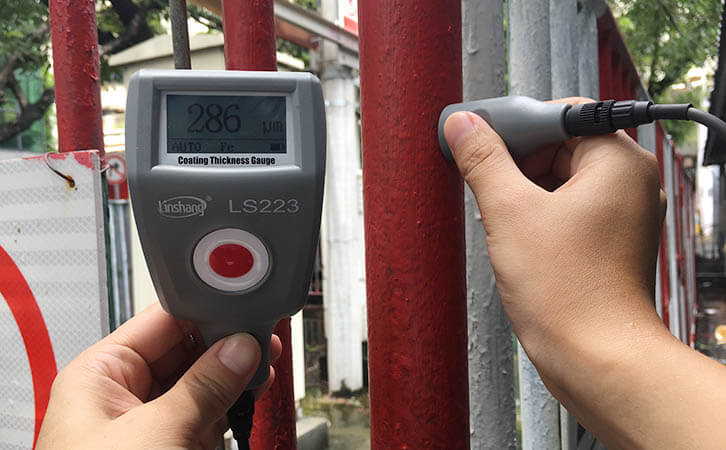Role of Different Anti-corrosion Coatings and Coating Thickness Gauges
The air is full of more oxidizing components and some more corrosive components (moisture, oxygen, acid and alkali components, dust, grit, etc.), the metal manufacturing industry will take some basic protection measures: on the surface of metal products, which is often referred to as an anticorrosive coating. Its performance and strength testing always depends on the coating thickness gauge.
1. Concept of anticorrosive coating
The anticorrosive coating is always applied uniformly as the protective layer on the metal substrate surface and the thickness conforms to national regulations. The anticorrosive coating has relatively uniform anticorrosive protection, but we will divide it into different types according to the actual substrate: (oxygen anticorrosive coating, scale anticorrosive coating, epoxy polyester mixed coating Layer, outdoor pure polyester coating), these anticorrosive coatings have different thickness requirements.
2. Classification and role of anticorrosive coatings
(1) Epoxy anticorrosive coating
The main raw material of epoxy anticorrosive coating is epoxy resin. This material has strong water resistance and the anticorrosive layer made can effectively waterproof. In addition, its abrasion resistance is also relatively strong and it can resist external scratches. The actual thickness of the epoxy anticorrosive coating is often applied according to the requirements of the first party.
(2) Scale anticorrosive coating
The characteristics of this anti-corrosion coating are very clear: it is quite resistant to high temperatures. It can have strong chemical stability when sprayed on the surface of iron products or other non-metallic substrates. In the actual construction process, the scale anticorrosive coating has a strong blocking degree and a fast forming speed. The anti-corrosion coating thickness is commonly controlled by industry insiders. This coating is controlled at 80-100 microns by coating thickness gauge.
(3) Epoxy polyester hybrid coating
This hybrid coating exhibits a variety of protective properties and can be made from a variety of high viscosity, high resistance and high hardness materials. It is often used on the metal substrate surface and in the field of anti-corrosion heavy industry. The anti-corrosion coating thickness depends on the use of the product, usually ranging from tens to hundreds of microns.
(4) Outdoor pure polyester coating
Outdoor pure polyester coating has strong UV resistance and very good mechanical properties. Most of the time, outdoor pure polyester coatings are used to protect outdoor lamps or air conditioners. They have been placed in the external environment for a long time, the pores of this coating are almost zero. This also improves the abrasion resistance of outdoor pure polyester coatings.
3. Use the coating thickness gauge to detect anticorrosive coating thickness
Although we can classify anti-corrosion coatings into four categories based on basic materials, the thickness of the same kind of coatings can also vary greatly. In order to strengthen quality control in many industries, coating thickness gauges are often used to increase the rate of product shipment. The error range of our anticorrosive coating is generally controlled at about -25μm. Deviation from this value will cause the product surface to be uneven and the protective effect of the anticorrosive coating will be greatly reduced.
LS223 Coating Thickness Gauge Measure Anticorrosive Coating Thickness
The coating thickness gauge is an intelligent non-destructive measuring instrument, which can quickly respond and accurately display the anti-corrosion coating value of the measured object. It has a strong guiding role for technicians in the industry to adjust the anticorrosive coating thickness. It is more meaningful for consumers who need to apply anticorrosive coatings.
- High precision coating thickness gauge for used car
- Automotive paint protection films coating thickness gauge
- Plating Thickness Measuring Instrument for Detecting Anti-corrosion Coating
- Linshang LS220, LS191, LS160A– Necessary for Car Cover Inspection
- Coating Thickness Gauge for Second Hand Vehicle
- Zero Adjustment Step of Coating Thickness Gauge
